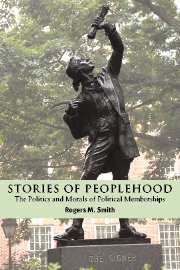Book contents
- Frontmatter
- Contents
- Acknowledgments
- Introduction: on studying stories of peoplehood
- Part I Explaining the political role of stories of peoplehood
- 1 Elements of a theory of people-making
- 2 The role of ethically constitutive stories
- Part II Constructing political peoplehood in morally defensible ways
- References
- Index
1 - Elements of a theory of people-making
Published online by Cambridge University Press: 22 September 2009
- Frontmatter
- Contents
- Acknowledgments
- Introduction: on studying stories of peoplehood
- Part I Explaining the political role of stories of peoplehood
- 1 Elements of a theory of people-making
- 2 The role of ethically constitutive stories
- Part II Constructing political peoplehood in morally defensible ways
- References
- Index
Summary
Varieties of political peoples
Theories must be theories of something. One of the goals of this book is to persuade contemporary American political scientists that they should take as central to their theorizing some topics that have long been treated as marginal or beyond their disciplinary concerns. When American political science underwent what scholars call its “behavioralist revolution” in the 1950s, many outstanding scholars came to believe that the study of politics should be understood as the empirical analysis of the behavior of human “interest groups.” Others preferred to study the conflicts of “classes” in Marxist fashion. Some analyzed the functions of “systems” in imitation of the sociologist Talcott Parsons. Others focused on the often-irrational workings of individual psyches; and some continued to stress the internal traits and tendencies of human institutions and of bodies of ideas. Today many study politics as the preference-driven actions of instrumentally rational individuals.
Without disdaining any of those enterprises, I suggest that an intellectually adequate political science must also focus on what I regard as a quite basic dimension of all political activity, one that has not been so directly addressed by prevailing approaches: the making, maintaining, and transforming of senses of political peoplehood. Sometimes this activity dominates political life. Often it is an important but muted component of political action, and at times it is more marginal. In the final analysis, however, it structures politics – and human beings – too fundamentally to be ignored.
- Type
- Chapter
- Information
- Stories of PeoplehoodThe Politics and Morals of Political Membership, pp. 19 - 71Publisher: Cambridge University PressPrint publication year: 2003

